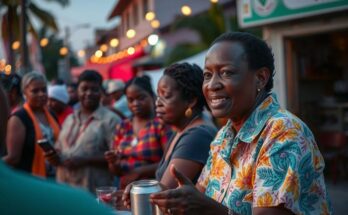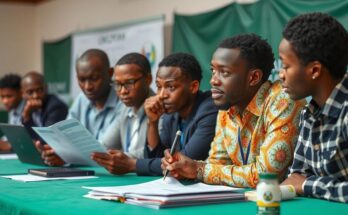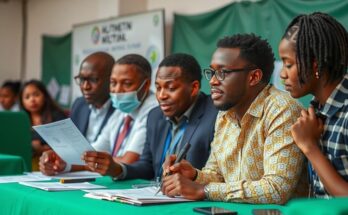As Mozambique approaches its presidential elections on October 9, the ruling party Frelimo appears to be the front-runner with candidate Daniel Chapo dominating the campaign. His main opposition, despite multiple parties running, is fragmented and struggling for visibility and support. While Chapo exudes confidence, concerns linger over the internal challenges faced by the opposition and the readiness of the National Election Commission to oversee the elections fairly.
Mozambique’s capital, Maputo, has been adorned in red banners for several weeks as the election campaign leads up to the pivotal October 9 presidential elections. The color red symbolizes the ruling party, Frelimo, which has maintained a grip on power since Mozambique gained independence nearly five decades ago. With President Filipe Nyusi term-limited after ten years in office, Frelimo has introduced 47-year-old Daniel Chapo, the former governor of Inhambane province, as their new candidate. Chapo’s campaign posters dominate the urban landscape, overshadowing the limited presence of competing parties. A total of 36 political parties are vying for 250 parliamentary seats, yet Frelimo’s opposition appears disjointed and underwhelming. Notably, Ossufo Momade from the largest opposition party, Renamo, faces difficulties garnering enthusiasm, as dissatisfaction with his leadership grows within his ranks. The Democratic Movement of Mozambique (MDM), led by Lutero Simango, advocates for political reforms but similarly struggles to rally support. Venancio Mondlane, formerly with Renamo, has emerged as a figure of hope for younger voters despite facing exclusion from parliamentary elections. The National Election Commission (CNE) has expressed confidence in its preparedness for the elections, with over 17 million registered voters, including expatriates. Speculations suggest that Daniel Chapo is likely to succeed President Nyusi as the next leader of Mozambique, continuing Frelimo’s long-standing dominance in the country.
The political landscape of Mozambique is heavily influenced by Frelimo, the party that has been in power since the country’s independence in 1975. The upcoming elections signify a pivotal moment for the nation, as the ruling party introduces a new presidential candidate after a decade under President Nyusi. The opposition, although permitted to participate, is marked by fragmentation and internal strife, prompting questions about their viability against Frelimo’s entrenched power. The National Election Commission’s role has become crucial in ensuring a fair electoral process amidst concerns over logistical challenges and the exclusion of certain parties.
In summary, the impending elections in Mozambique appear to favor the ruling party, Frelimo, and its candidate Daniel Chapo, amid a backdrop of a divided opposition. While Chapo’s confidence reflects a belief in electoral supremacy, the dissent within rival parties reveals underlying challenges. The efficacy of the National Election Commission will play a significant role in determining the overall integrity of the electoral process, as millions prepare to cast their votes. The outcome of these elections could potentially reinforce Frelimo’s long-standing rule or signal a shift in Mozambique’s political dynamics, depending on voter engagement.
Original Source: www.dw.com




